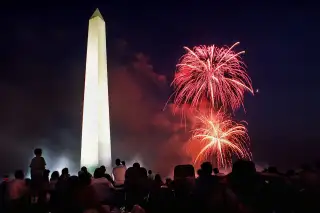Can You Buy Real Fireworks in Your State? Check Out This Map

Every summer the question comes up: Can you buy fireworks in your state? Most attempts at an answer point to the American Pyrotechnics Association's handy map of state laws, but they fail to note the not-so-fine print that reads, "47 states plus the District of Columbia allow some or all types of consumer fireworks."
That "some" makes all the difference, especially on the Fourth of July, when the stakes are high.
There is a major categorical difference between ground-based spark-spitters like sparklers and roman candles and real fireworks. And when I say real, I mean something that shoots up into the sky and goes boom—approximating, albeit at a backyard level, the experience you get from display fireworks a city or sports team might put on.
Read next: 15 Ways to Celebrate the Fourth of July Under $10
State by state legality of authentic capital-F Fireworks is much more tightly controlled, due to the dangerous nature of these pyrotechnics, which can contain up to two grains of explosive material—typically the maximum allowed if a state uses the DOT's classifications for consumer fireworks. But some states still do allow individuals to purchase these boom-in-the-air types of fireworks, which commonly include mortar shells that get shot up by a charge like a cannon and skyrockets, which have a little rocket motor that propels them into the sky.
Using data compiled by the American Pyrotechnics Association, we put together a map of the country, showing where aerial, explosive fireworks are permitted. (Yes, it does match up uncannily well with the traditional map of red states and blue states.) They are legal in green states, banned in red states, and sort of legal in yellow states. Click on a state to get more information about selling periods and fines, if applicable.
In Ohio, for example, you can buy fireworks—legislators want to keep the business in state, after all—but you can't set them off. And in Nebraska, fireworks can shoot up into the air, but they can't have an explosive charge.
But this is America, a place with strong traditions of both fireworks and civil disobedience, and many people will insist on rockets' red glares and bombs bursting in air—in 2014, to the tune of $675 million spent on fireworks.
So we've made another map showing exactly how illegal it is to possess fireworks in your state, using the severity of fines as the metric. In the green states, it's legal to have fireworks as a consumer; in the red ones it's not. The darker the red, the greater the penalty.
If the law offers a range of fines, we've taken the average, so your penalty could be worse or better than indicated. Also in many cases prison time is possible; fireworks offenses are usually misdemeanors, not simply violations. Click on a state for details and links to further information. Many counties, municipalities, and towns have their own laws in addition to state ones, so the fines and other penalties could be far higher.
If you do live in a fireworks-friendly area, remember that even legal fireworks can be incredibly dangerous. According to the most recent Consumer Product Safety Commission report on fireworks from 2014, 11 people died that year and 10,500 people were injured—and 7,000 of those injuries happened between June 20 and July 20. Be safe out there.